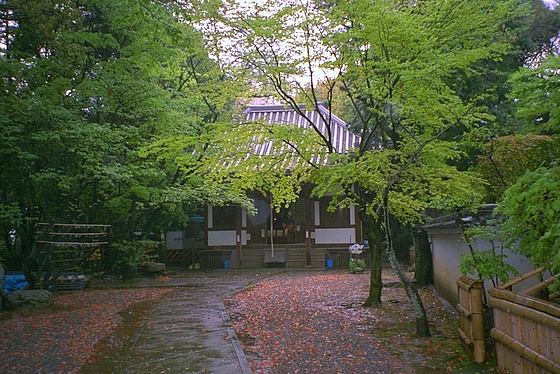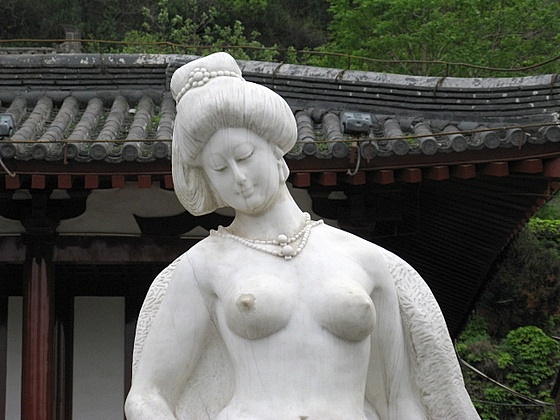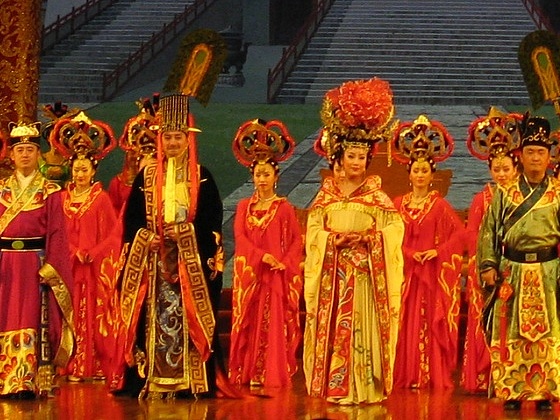Princess Yang Kwei-fei (Yang Guifei)
The affair of the last Tang emperor in China and his beautiful concubine, Yang Guifei (Yang Kwei-fei) was the great love story of the age and often mentioned in ancient Chinese and Japanese literature.
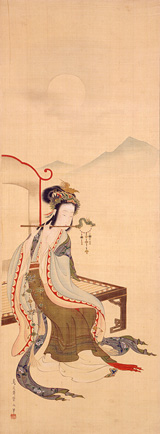 "The Song of Unending Sorrow," by Po Chu-i
(772-846), was the most popular
Chinese poem in Heian Japan. With some embellishment, it recounted the
true story of how Yang Guifei (Yokihi in Japanese) rose from
obscurity to win the heart of an
emperor, before causing his downfall and that of the entire Tang
Dynasty.
"The Song of Unending Sorrow," by Po Chu-i
(772-846), was the most popular
Chinese poem in Heian Japan. With some embellishment, it recounted the
true story of how Yang Guifei (Yokihi in Japanese) rose from
obscurity to win the heart of an
emperor, before causing his downfall and that of the entire Tang
Dynasty.
Emperor Xuanzong (Hsuan Tsung), a grandson of Empress Wu Zetian (Wu-chao, Wu-hou) who ruled from 713-756, was a wise and forward-looking ruler during the early years of his reign. Yang Guifei was originally married to one of his sons in 736, at the age of 18. The emperor, already in his 50s, quickly became infatuated with her and, in 741, she abandoned her husband and entered a Taoist nunnery. By 745, the emperor had arranged for his son to marry another woman and made Yang Guifei (Yang Kwei-fei, Yang Kuei-fei, Yang Gueifei) his "Precious Consort."
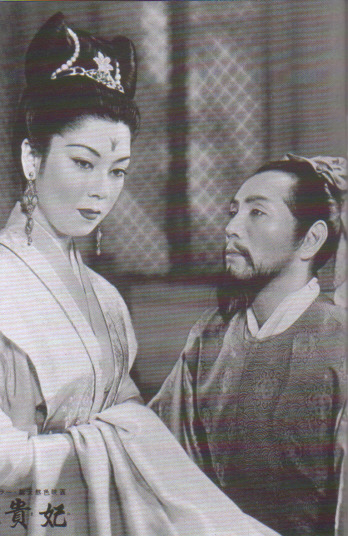 From this time on, Xuanzong neglected affairs of state and allowed his
court to lapse into decadence. Meanwhile, Yang Guifei caused something
of a scandal with her close relationship with An Lu-Shan, a powerful
general of Turkic origin. Eventually she adopted the corpulent,
48-year-old general.
From this time on, Xuanzong neglected affairs of state and allowed his
court to lapse into decadence. Meanwhile, Yang Guifei caused something
of a scandal with her close relationship with An Lu-Shan, a powerful
general of Turkic origin. Eventually she adopted the corpulent,
48-year-old general.
A variety of natural disasters and two military defeats caused unrest in the empire, culminating in a rebellion led by An Lushan in 755. As the victorious rebel forces advanced on the capital, Xuanzong and his court fled towards Chengdu in Sichuan (Szechwan). On the way, the imperial guard mutinied and killed Yang Guifei's brother, the prime minister. Blaming the Yang family for the empire's troubles, the troops forced the emperor to have his beloved concubine strangled.
An Lushan's power didn't last long, however. He was assassinated by his son and eventually the Tang dynasty regained control. When Xuanzong finally returned to the capital, Chang'an (Xian), he was seized by remorse and tried using a Taoist priest to contact Yang Guifei in the netherworld.
According to the poem, the priest manages to contact her, bringing back half a gold hair comb, which the emperor knew belonged to her, and a message:
And she sent him, by his messenger, a sentence reminding him of
vows which had been known only to their two hearts:
'On the seventh day of the seventh month, in the Palace of Long Life,
We told each other secretly in the quiet midnight world
That we wished to fly in heaven, two birds with the wings of one,
And to grow together on the earth, two branches of one tree.'
... Earth endures, heaven endures; sometime both shall end,
While this unending sorrow goes on and on forever.
This yearning to find a lost loved one is a theme that occurs twice in the Japanese classic The Tale of Genji. Both Genji and his father lose someone dear to them.
The "seventh day of the seventh month" refers to the legend of the herdboy and the weaver girl, represented by the stars Altair and Vega. The two lovers are separated by the Milky Way, and only meet once a year on the seventh day of the seventh lunar month, crossing the heavens on a bridge of magpies. This legend is still celebrated in Japan by the Tanabata Festival.
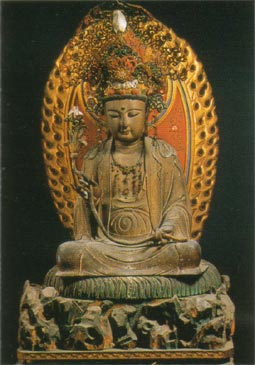 The events at court leading up to the An Lushan rebellion are
described in
A Floating Life: The Adventures of Li Po - a fictionalized
biography of the extraordinary poet who was a witness to the events. A
rather different version of the story is shown in Kenji Mizoguchi's
movie,
Princess Yang Kwei-fei (also on
VHS). In Mizoguchi's
version, Yang Guifei is a woman manipulated by family and politicians, an innocent
victim of fate.
The events at court leading up to the An Lushan rebellion are
described in
A Floating Life: The Adventures of Li Po - a fictionalized
biography of the extraordinary poet who was a witness to the events. A
rather different version of the story is shown in Kenji Mizoguchi's
movie,
Princess Yang Kwei-fei (also on
VHS). In Mizoguchi's
version, Yang Guifei is a woman manipulated by family and politicians, an innocent
victim of fate.
It is said that when Yang Guifei died, the emperor missed her so much that he had her sculpture made in the image of Avalokitesvara (Kannon), which was brought to Sennyu-ji Temple in Kyoto by the priest Tankai in 1255. It is located in a small Kannon-do in the temple grounds and known as the Yokihi Kannon or Empress Yang-Avalokitesvara.
The Kannon-do at Sennyuji is one of the 33 places of worship on the Rakuyo ("Loyang") Pilgrimage.
Yang Guifei's story is well-known to fans of Kabuki and the dance Yokihi has been
performed by Bando Tamasaburo.
However, it is in China where Yang Guifei remains brightest in the public's imagination. Emperor Xuanzong's palace at
Huaqing Hot Springs remains a major tourist attraction only 40 kilometres from the ancient capital, Xian. There you can
see Yang Guifei's bath, originally rimmed with pink jade, and various other buildings associated with her. Jade ("yu")
was considered so precious that it was often used in women's names. Yang Guifei's original name (Guifei was a title) was
Yang Yuhuan, meaning "jade ring." Pink jade is associated with beauty, and it is said that Emperor Xuanzong would only
allow Yang Guifei to wear it.
